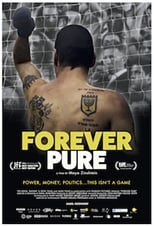As told to Director Maya Zinshtein, what goes on in a stadium is not just a mirror of society, but indicates the direction society is going.
Forever Pure is a uniquely panoptic film of soccer and society. We see that football clubs can be a toy for oligarchs, a tool for politicians, a burning torch for militant supporters groups, a trauma for its players and staff, and a testament that the good guys don’t always win.
Zinshtein, who is an investigative journalist, had the chance to cover the arrival of 2 Muslim Chechen players at Beitar Jeruslam FC. After 4 days with the club, she realized there was a bigger story and convinced club Chairman Itzik Korenfine to let her follow them for the rest of the season.
She and her cameraman embedded themselves in the club. As a result, the participants trusted her and were open. We are privileged to view a story that is not necessarily visually beautiful, but is beautiful in its honest portrayal of pain and ugliness.
Unlike all the other teams in the Israeli Premier League, Beitar has not allowed Arabs to play for them. Before the Chechens arrive, even though they are not Arabs, the ultra supporters group La Familia holds up a forbidden “Beitar Forever Pure” banner. La Familia fans crowd the practice field in anger, chanting “Death to Arabs” and “War! War! War!”. They swear at Beitar players they feel are complicit.
The Players and Club
Ariel Harush, the once popular captain and goalkeeper, tries to adjust to the new hate coming his way. He is only 24. The team is young–80% are local home-grown players who grew up with the fans and text with them. Everyone hopes the fans will come around after a few wins.
But a Molotov cocktail destroys the trophy room. La Familia institutes a boycott. Game attendance drops as low as 1,700. When Chechen Zaur Sadayev finally scores, La Familia fans walk out of the stadium. As the season progresses, the coach tries to rally his failing team, but Beitar drops down the table from 4th to the relegation zone.
Inside the club, everyone is a good soldier trying to make the best of a bad situation. The Chechens have 24×7 bodyguards. The Chairman is taught how to inspect his car for bombs.
The Oligarch
Russian-Jewish owner Arkadi Gaydamak was honest with Zinshtein, and his reasons for forcing the Chechens on the club are easy to guess. In film festival interviews, Zinshtein confirmed that Gaydamak was probably trying to get back at the city of Jerusalem. After buying the team and contributing millions to social causes, he won only 3.6% of the vote in his run for mayor. Over the next 4 years, he stopped investing in the team. The crop of talented home-growns had brought the team back into contention despite his neglect.
The Politicians
The film shows how and why Beitar ownership or sponsorship is the path to political power in Jerusalem. While La Familia are the thugs, to Zinshtein, the true bad guys are the politicians. For decades they allowed La Familia’s stadium behavior and racist identity, and they even pandered to it. Their silence, as well as the large fan adherence to the boycott, legitimized the anti-Arab racism.
The Aftermath
For me, it was a bit of shock and awe to see that the ultra fans had won. When they say Beitar is their club and identity, they are not exaggerating. Even today, it appears that only FIFA and UEFA can change the club, by enacting stiff penalties and exclusion from international events. The lessons from this film reinforce a society’s need to speak out against all forms of discrimination and inequality when they occur.
The Soccer
There is a lot of good game footage to show the goals, the losses, and the fans. There are many intense fouls in the final relegation game against Bnei Sakhnin, the only Israeli-Arab team in the Israeli Premier League.
Another great film from a Woman Director

Soccer Movie Mom Rating = 10

10 Soccer Movie Mom Rating = 10
Resources:
- Released: 2016-07-12 (Jerusalem)
- In Hebrew with English sub-titles
- The title in anglicized Hebrew is Tehora la’ad
- I watched this on Netflix
- IMDB
- Director: Maya Zinshtein
- Stars: Arcadi Gaydamak (Arcady Gaydamak) , Itzik Korenfine (Kornfein) , Ariel Harush ( אריאל הרוש ) , Zaur Sadayev (Sadaev) ( Садаев Заур Умарович ) , Dzhabrail Kadiyev (Kadiev) ( Кадиев Джабраил Асланбекович )
- Watch the Trailer
- Watch a 10-minute teaser in The Guardian
- Forever Pure Film website is no longer available

